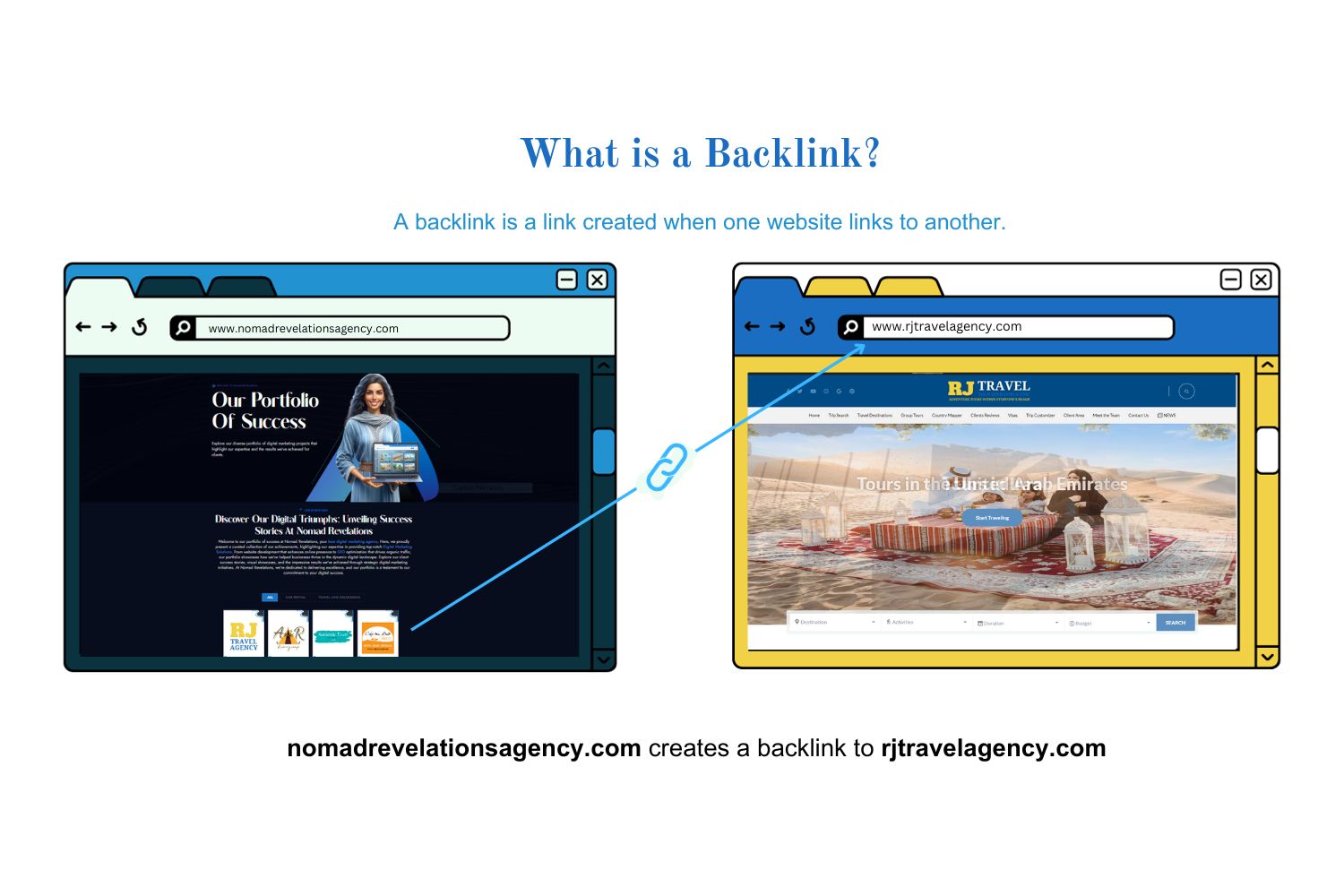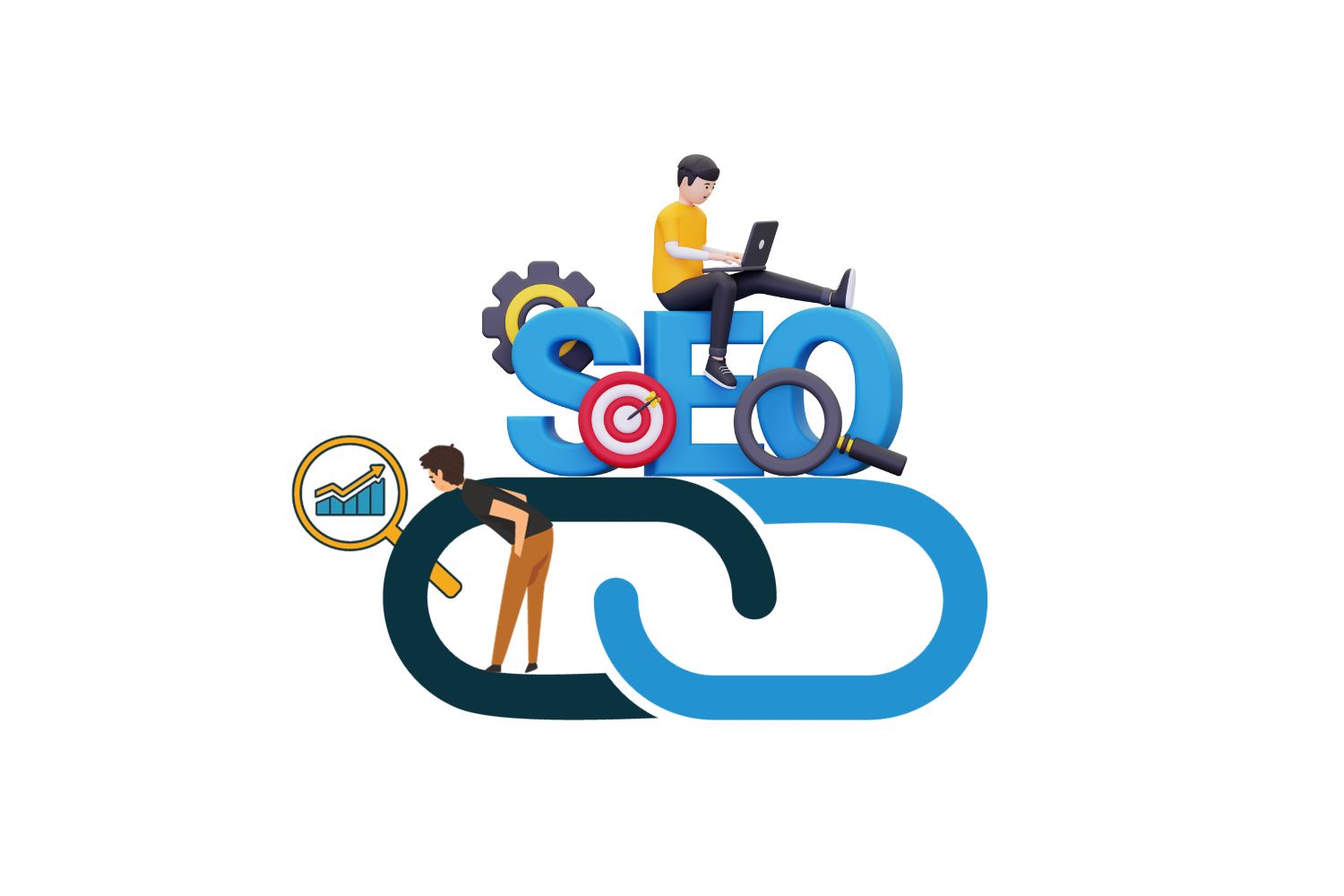
The Backlink importance in SEO: A Complete Overview
What Exactly Are Backlinks?

Imagine backlinks as digital nods of approval from one website to another. When a website links to your site, it’s like they’re giving you a thumbs up in the online world. These backlinks, also known simply as ‘links’, ‘inbound links’, or ‘incoming links’, are crucial for navigating the internet and boosting your site’s Search Engine Optimization (SEO).
So, what exactly is a backlink in the SEO realm? It’s a hyperlink from someone else’s website to yours. These quality links can elevate your position in search engine rankings and enhance your visibility, leading to more web traffic.
But remember, backlinking is just a piece of the SEO puzzle. It’s part of what we call off-page SEO, as it happens outside your own website, in contrast to on-page SEO, which is all about your site’s content. Think of high-quality backlinks as strong recommendations from other sites, urging their visitors to check out your content for more information on a topic.
In the grand scheme of things, backlinks are key indicators for search engines to assess your website’s authority and relevance for specific search terms. The more authoritative your content, the higher Google places you in the search results, making backlinking an essential strategy for effective SEO.
The important of backlinks?

Understanding the Importance of Backlinks in SEO:
You now understand what backlinks are, but you might still be wondering about their importance in the grand scheme of SEO. Backlinks are more than just links; they are pivotal in boosting your website’s growth. For many small businesses venturing into the world of SEO, the focus is often solely on on-page tactics, like embedding keywords in content to climb search engine rankings and increase web traffic. However, this is just one piece of the puzzle.
Backlinks as Endorsements:
Backlinks play a much more significant role than you might think. They act like endorsements from other websites, with each one essentially telling search engines, “This content is outstanding, reliable, and incredibly valuable.” This aspect of SEO is crucial because it helps your website stand out in a sea of competitors, all vying for that top spot on search engine result pages.
The Power of Votes in SEO:
Imagine the process of gathering backlinks as a campaign to collect votes. The more ‘votes’ your website receives in the form of backlinks, the higher it climbs in search engine rankings. It’s similar to running for class president – the more votes you have, the greater your chances of winning. But it’s not just about the number of votes; the quality of these votes matters immensely. High-quality backlinks from reputable and relevant websites carry more weight than numerous links from lesser-known, low-quality sites.
Crafting a Winning Backlink Strategy:
In conclusion, backlinks are more than just a trust signal for search engines; they’re a testament to the authority and quality of your website’s content. They play a critical role in not only enhancing your position in search engine rankings but also in establishing your site as a trustworthy and valuable resource in your field. So, if your goal is to dominate that first page of search results and reel in more organic traffic, developing a robust backlink strategy is indispensable.
What Kinds of Backlinks Are Most Useful?

Backlinks are like the currency of the SEO world, but just like in real life, not all currency holds the same value. It’s crucial to understand that the quality and relevance of your backlinks are what really count when it comes to boosting your website’s SEO. Let’s explore some of the most impactful types of backlinks:
Editorial Backlinks: Picture these as glowing recommendations within another website’s content. They’re given because your content is genuinely useful, making them highly trustworthy and valuable in the eyes of search engines.
Links from High-Authority Websites: Imagine getting a nod from a celebrity in your industry. These backlinks come from established names and carry a lot of weight, enhancing your site’s credibility.
Relevant Backlinks: Relevance is key. Links from websites related to your niche are like having friends in the right circles—they add context and value to your site.
Dofollow Backlinks: These are the bread and butter of backlinks, passing on SEO benefits and authority from the source site to yours.
Contextual Backlinks: Think of these as backlinks with a personal touch. They’re integrated within content like blog posts, making them more meaningful than links placed in footers or sidebars.
Backlinks from Diverse IP Addresses: Diversity matters. Links from various sources are better than many links from the same place, as they add to your site’s credibility and avoid looking spammy.
Guest Posts on Reputable Sites: Contributing quality content to well-known sites not only earns you valuable backlinks but also showcases your expertise.
Social Media and Forum Links: While they might not be the strongest for SEO, they’re great for driving traffic and increasing visibility.
.edu and .gov Backlinks: Links from educational and government institutions are like gold stars for your site, often carrying significant SEO weight.
Natural Backlinks: The best kind of backlinks are those that come naturally because your content is just that good. They’re given without you having to ask, making them incredibly valuable.
Remember, it’s not just about how many backlinks you have; it’s about the quality and relevance of those links. Building a natural, diverse backlink profile over time is the key to lasting SEO success. And always keep Google’s guidelines in mind to ensure your backlink strategy is up to date and penalty-free.
Is Linking Out Bad for Your SEO?
There’s a common myth in the SEO world that linking out to other websites can harm your SEO, as if you’re somehow losing some of your site’s value. However, the reality is more nuanced and interesting. Linking out, especially to high-quality and relevant sites, can actually be a positive action for your SEO. It’s akin to providing references in a research paper, showing that you’re well-researched and connected to the broader community. This is something search engines, like Google, appreciate as it indicates the credibility and usefulness of your content.
When you link to trustworthy and authoritative sources, you’re adding more value to your content. It’s a way of telling your readers, “Here’s the source of my facts,” or “Here’s where you can learn more.” This approach can significantly enhance the user experience, which is a crucial element in SEO. But, like all good things, it’s important not to overdo it. Excessive linking or linking to low-quality sites can have a negative impact. It’s about striking the right balance and ensuring your content still maintains its originality and insight.
You also have the option to control the nature of your outbound links through ‘nofollow’ tags, which tell search engines not to pass SEO credit to the linked site. It’s a way of recognizing other content without fully endorsing it. Being strategic about your outbound links is key. You should aim to link to content that is genuinely beneficial and relevant to your audience, curating a high-quality experience rather than overwhelming them with too many choices.
In conclusion, outbound links are an essential part of a holistic SEO strategy. They shouldn’t be shunned or used indiscriminately but incorporated thoughtfully to enhance the quality and richness of your content. Think of them as part of your website’s ecosystem, contributing to the overall value and authority of your site when used correctly.








